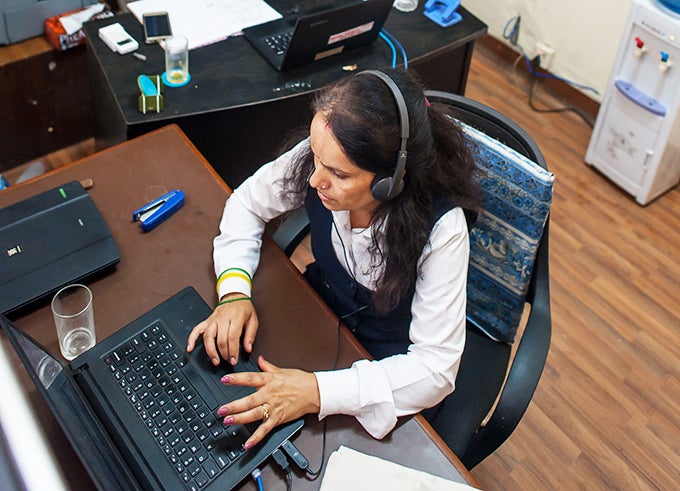
Last month, I visited Nepal to understand the gravity of gender-based violence (GBV) and how victims can seek help and access confidential and quality support services.
Nepal has a high incidence of gender-based violence. And while everyone, regardless of their sex, can be affected, women remain — by large — the main victims.
In 2017, 149 people were killed as a result of GBV in Nepal.
Of these victims, 140 were female, 75 of whom were killed because of domestic violence.
In 2017, out of 680 documented cases, the main perpetrator was a family member or relative in 163 cases of them.
However, such cases are generally unreported due to the stigma attached to GBV.
In this bleak context, it was heartening to hear about an integrated platform that addresses GBV issues and has helped improve response and support to the victims.
With assistance from the World Bank’s State and Peacebuilding Fund (SPF), the government of Nepal has set up a helpline and a network of service providers for GBV victims.
Since 2017, these programs have supported over 677 cases.
The National Women Commission (NWC), a government body that protects and promotes women rights and interests, has been at the forefront to address the problems of women who are victims of GBV.
In December 2017, NWC launched its GBV helpline Khabar Garaun 1145, which has received 37,249 calls from November 21, 2017 to June 30, 2018.
Of the total calls, 677 cases were registered in the helpline’s case management system, 413 were referred to partner service providers, and 264 cases were resolved.
On the upside, the reporting of GBV cases has increased, and survivors have started coming forward.
A total of 4559 callers were seeking information about GBV, existing legal protections, and how to access support services.

During recent visits to NWC’s service providers such as SAATHI, an NGO that offers shelter to victims, Legal Aid Coordination Committee (LACC), and Transcultural Psychosocial Organization (TPO Nepal), I learned of a case where a 15-year old girl was raped by her alcoholic father.
She managed to escape and was rescued by a police van patrolling nearby. The police referred her to the NWC Helpline which took up her case. After an initial assessment, the NWC, together with LACC and in close collaboration with Nepal police, arrested her father and took him into custody.
As the girl’s stepmother was away in her village, leaving the girl’s two minor half-brothers at home with no supervision, NWC coordinated with Child Workers in Nepal (CWIN) to arrange temporary shelter for the boys until her stepmother returned.
NWC provided psycho-social counseling to the girl, who was then taken to One Stop Crisis Management Center (OCMC) at the Government’s maternity hospital for a medical check-up, provided free of charge by the OCMC.
The medical report showed that she was seven weeks pregnant. NWC and LACC jointly coordinated with a government lawyer to file a petition at the district court to terminate her pregnancy.
The court fast-tracked the case and issued a verdict in her favor.
After her operation, she was referred to SAATHI to receive long-term shelter.
Sapana Maharjan, a project coordinator at SAATHI, said that with regular counseling the girl is slowly regaining her health and has started going to school.
“I don’t want to think about ‘that phase’ at all. I just want to pursue my studies and be a singer,” Sapana quoted the girl, adding that she has a very good voice. “If she wants to continue her education, we can provide her with schooling up until grade 12.”
The above case is a concrete example of how NWC can play a crucial role in facilitating various services for GBV survivors, through receiving calls made to Khabar Garaun 1145 Helpline, as well as through providing services via its partner NGOs and through other referral mechanisms. NWC’s case management system also ensures an efficient tracking mechanism.
Thanks to these advocacy and awareness efforts, reporting of GBV cases has increased.
To meet the needs and expectations of GBV survivors, and help prevent further cases of GBV, a strong service provider referral mechanism needs to be implemented , coupled with effective collaboration across supporting organizations. This will help facilitate efficient and timely response.
In a country like Nepal, the stigma associated with GBV and fear of community backlash also prevents victims from seeking appropriate services.
According to Nepal Demographic Survey 2016, 66% of women who have experienced physical or sexual violence have not sought help to end the violence, nor have they shared their experiences.
This can, in turn, aggravate the situation of survivors, leading to prolonged mental and physical suffering, and in some cases, to suicide or death.
It is, therefore, crucial to increase women’s knowledge about existing laws against GBV, and of the services that are available for victims to access. The initiative of NWC to collaborate with the Nepal Police, OCMC, other donor partners, and NGO service providers, to expand the available quality services is commendable and praiseworthy.



Join the Conversation